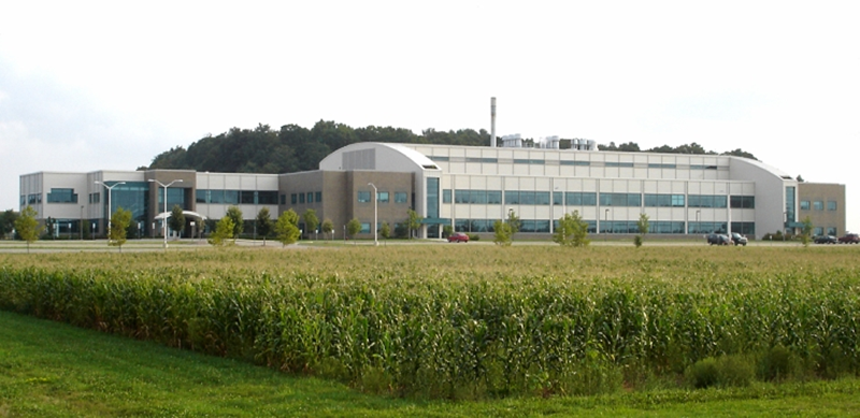
About the Laboratory
Who We Are
The Michigan State University Veterinary Diagnostic Laboratory (MSU VDL), a service unit in the College of Veterinary Medicine, is a full-service, fully accredited veterinary diagnostic laboratory for all species. Serving livestock, poultry, horses, and wildlife as well as companion, exotic, aquatic and zoo animals, the MSU VDL is equipped to assist with the care of animals throughout every stage of their life cycle. Our comprehensive test offerings give clients easy access to routine and specialty diagnostics.
The MSU VDL employs approximately 135 professional, technical, and support staff. View our directory for more information on our diagnostic team.
What We Do
Protect.
This state-of-the-art facility is a critical first line of defense in safeguarding Michigan domestic animals and wildlife from deadly diseases including foreign animal diseases, in alerting public health officials to the presence of diseases transmissible from animals to humans, and partnering with State and Federal agencies to monitor and prepare to respond if needed to terrorist threats that may impact animal or human health. The MSU VDL operates Biosafety Level 2 and 3 (BSL-2 and BSL-3) facilities and is a member of key federal networks created to enhance the nation’s ability to respond quickly to an animal disease outbreak:
- NAHLN: National Animal Health Laboratory Network (USDA)
- LRN: Laboratory Response Network (CDC)
- Vet-LIRN: Veterinary Laboratory Investigation Network (FDA)
- FERN: Food Emergency Response Network (USDA-FDA)
- NPIP: National Poultry Improvement Plan
Our membership in these networks requires such activities as successfully completing proficiency tests, electronically messaging results to centralized databases, maintaining a robust quality assurance system, and meeting the standards in external audits.
Investigate.
The MSU VDL provides diagnostic expertise in the following service sections:
- Anatomic & Surgical Pathology – Microscopic examination and interpretation of surgical biopsies; immunohistochemistry; postmortem examinations.
- Bacteriology & Mycology – Isolation and identification of disease-causing bacteria and fungi and susceptibility testing.
- Clinical Pathology – Diagnostic testing in the areas of clinical biochemistry, hematology, hemostasis, immunology, urinalysis, and cytology. Note: This laboratory section is located at the Veterinary Medical Center.
- Endocrinology – Determination and interpretation of circulating hormone concentrations.
- Immunodiagnostics & Parasitology – Diagnostic testing based on detection of antibody and other immune-mediated molecules produced in response to a disease. Identification and diagnosis of diseases caused by or related to parasitic infection.
- Nutrition – Analysis for levels of vitamins and other elements critical to nutritional status.
- Toxicology – Diagnosis and identification of poisonous substances (metals, pesticides, drugs, etc.).
- Virology – Identification of disease-causing viruses.
Educate.
Our robust and diverse diagnostic caseload supports our educational mission which includes serving as a diagnostic learning center for veterinary students and veterinary technicians; providing applied, collaborative educational and research opportunities; training pathology and nutrition/toxicology residents; and conducting continuing education programs.
Collaborate.
Our commitment to service means that clinicians and other clients can often consult directly with the diagnostician responsible for their cases, further ensuring accuracy and continuity of care.
The MSU VDL is also an invaluable resource in identifying, tracking, and addressing emerging animal and public health issues. Our faculty and staff work with national, state, and local officials to investigate and counter threats like avian influenza, bovine tuberculosis, chronic wasting disease, West Nile virus, and more.
Who We Do It For
Since its inception, the MSU VDL has become one of the country's premier veterinary diagnostic laboratories. On average, we perform one million tests per year on approximately 180,000 cases for more than 300,000 animals. Currently, 43% of animals tested are farm animals (including horses) with nearly 100,000 bovine samples. Companion animals represent 49% of animals tested with canines representing the largest number of samples (over 130,000). Overall, the MSU VDL has a very diverse caseload which includes a large and growing share (8%) originating from zoos, aquariums, and other sources of exotic and/or wildlife species.
We have active clients in all 50 states, U.S. territories, and more than 20 foreign countries. Even as our geographic reach has expanded, we remain committed to serving the state of Michigan. Each year, we receive samples from all corners of the state and more than 400 Michigan cities. The ever-increasing demand underscores the importance of having trusted, quality diagnostic information to meet the nation’s myriad animal health needs.
Why We Do It
Established in 1976 in response to an unprecedented number of cattle deaths on farms throughout Michigan in 1973 and 1974, the Michigan State University Veterinary Diagnostic Laboratory (originally named the Animal Health Diagnostic Laboratory, and later the Diagnostic Center for Population and Animal Health) assisted the state in the management of toxic polybrominated biphenyls (PBBs), a fire-retardant chemical that had been inadvertently mixed with animal feed. The subsequent discovery of human PBB exposure from contaminated dairy products emphasized the central role of a state-of-the-art veterinary diagnostic laboratory in the protection of animal and human health.
Since that time, the MSU VDL’s mandate has been to protect the public by ensuring the health of animals in the state of Michigan and around the nation. The establishment of this important facility benefits pet owners and the livestock and wildlife industries, making quality, trusted, and comprehensive veterinary diagnostics widely available.
See more of the laboratory in a short video